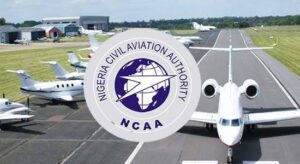Flight delays: Mixed reactions trail proposed slot allocation, surcharge for airlines
By Tobi Adetunji.
There are mixed feelings in the aviation sector over the proposal for slots allocation for airlines operating scheduled flights.
By slot allocation, each airline would be allocated a slot for take-off and any operator failing to depart within the allotted time would be surcharged.
Those pushing for slot allocation and surcharge argue that the system would minimise the avalanche of flight delays being experienced in recent times in the industry.
According to the Airport Council International (ACI) describes Airport slots as “specific points in time allotted for an aircraft to land or take off at an airport.”
Nigerian NewsDirect learnt that though the Federal Airports Authority of Nigeria (FAAN) had mulled the introduction of slots especially in the wake of the COVID-19 pandemic, nothing has been heard since then.
But with the capacity of the airport facilities constrained, stakeholders have recently mulled the idea, saying the system would reduce chaos, rowdiness and disorderliness at airport terminals.
It would be recalled that the Yuletide period was particularly chaotic at the Murtala Muhammad Airport domestic terminals with more passengers thronging both the General Aviation Terminal (GAT) and the MMA2.
However, with slots allocation, the proponents say this would not be the case as airlines would be cognisant of the take-off and landing time allocated to them and the attendant penalty for missing the allotted time.
The current situation where two or more airlines are struggling to take off at the same time and or land almost the same time, according to those pushing for slots allocation, breeds chaos and orderliness in the airport environment.
Expressing his views on the subject, a former Commandant of the MMIA, Group Capt. John Ojikutu, rtd, who has been consistent in advocating for slots said it is the way to go especially in minimising incidents of flight delays.
According to him, the airport terminals “are taking or pressurising more than they can ordinarily accommodate.”
But airlines are not comfortable with the suggestions, insisting the capacity constraint is a failure of the government to carry out facility upgrades at most of the airports.
For instance, they observe that the MMIA was built to handle 300,000 passengers annually but it now handles over 8m passengers.
According to an airline operator, airlines cannot be blamed for airport congestion, “If the airport management did not anticipate the peak period complications and prepare for it.”
Another airline official, Barr. Shehu Wada said airlines are not afraid of slot allocation if it can be well managed.
However, he was quick to point out that such a system could be problematic especially when flights could not take off or land on account of bad weather.
He confirmed that the airport authority had mulled the idea but failed to follow up on it again.




